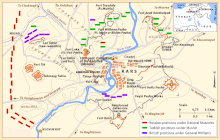Siege of Kars
| date | June to November 1855 |
|---|---|
| place | Kars |
| output | Russian victory |
| Parties to the conflict | |
|---|---|
| Commander | |
 William Fenwick Williams |
 Nikolai Nikolayevich Muravyov |
| Troop strength | |
| 30,000 men | 40,000 men |
Olteniţa - Akhaltsikhe - Başgedikler - Sinope - Cetate - Silistra - Nigojeti - Tscholok - Odessa - Kurekdere - Petropavlovsk-Kamchatsky - Alma - Sevastopol - Bomarsund - Balaklava - Inkerman - Yevpatoria - Taganrog - Çorğun - Kars - Tschernaja - Malakoff - Kinburn - Third Paris peace
The Siege of Kars was a military conflict between the Russian Empire and the Ottoman Empire in the Crimean War . It ended with the capture of the city of Kars by the Russians.
Background and starting position
While the Imperial Russian Army tried to repel the siege of Sevastopol in the Crimea , it fought more successfully in the Asian theater of war. The western allies of the Ottoman Empire had sent only a few military advisers. To defend the Armenian highlands, the Ottomans had concentrated the army corps from Asia Minor , Mesopotamia and part of the Syrian corps in the border area. On November 26, 1853, General Ivan Andronikashvili and 10,000 men routed the Turkish main corps at Suflis . General Bebutov , at the head of a corps of the Caucasian army, triumphed on December 1, 1853 in the Battle of Basgedikler over Abdi Pasha , the Turkish commander in eastern Anatolia, which thwarted the intended Turkish invasion of Russian Armenia . Abdi Pascha was then deposed and tried before a military tribunal. He was succeeded by Akhmet Pasha. On June 16, 1854 Andronikashvili was again successful against 30,000 Turks at Osurgeti and was able to secure Mingrelia for Russia. In July 1854, the Russian general Wrangel invaded Turkish Armenia. On July 29, he defeated a Turkish division at Bajesid . The Turkish commander Zarif Mustapha Pascha attacked the Russians with more than 40,000 men in August. At Kurukdere he came across Prince Bebutow on August 5, 1854. In a five-hour battle, the Russians were able to defeat the Turkish army, but were unable to take advantage of the victory and take the important fortress of Kars due to their own high losses .
The siege
In 1855 General Muravyov was appointed Commander in Chief of the Caucasian Army. He marched into the Ottoman part of Armenia in June 1855 and was greeted with joy by the population there. With 40,000 men he reached Kars in northeastern Anatolia . After the 30,000 defenders under British officer William Fenwick Williams were able to repel the attack by the Russians, Muravyov began the siege of the fortress. Omar Pascha , the Ottoman commander who was successful in the Danube principalities, informed the Allies on July 11th that he would move his troops from Crimea to Asia Minor. The Allies were against this decision and only approved the plan in September. Omar Pasha's diversionary attack on Kutaisi was eventually foiled by General Bebutov. On November 29, the Ottoman occupation finally had to capitulate because of the poor supply situation and Muravyov was able to take the city.
Meaning and consequences
The success at Kars allowed Russia, despite the loss of Sevastopol, to conduct moderate peace negotiations.
For the defense of Kars, Williams was appointed Baronet and Knight Commander of the Order of the Bath . Muravjew was raised to the rank of prince for the conquest of the city and appointed adjutant general of Tsar Alexander II and a member of the Imperial Council.
literature
- German Werth: The Crimean War , Frankfurt / M. 1989, ISBN 3-548-34949-8
- AW Kinglake, The Invasion of the Crimea (nine volumes), London 1863–87. (Reprinted by Naval & Military Press May 2003, ISBN 978-1843424970 )
- Nicolae Jorga: History of the Ottoman Empire , Gotha 1913, ISBN 3-8218-5026-4
Individual evidence
- ^ Friedrich Engels: The war in Asia; New-York Daily Tribune No. 4608, January 25, 1856, editorial

